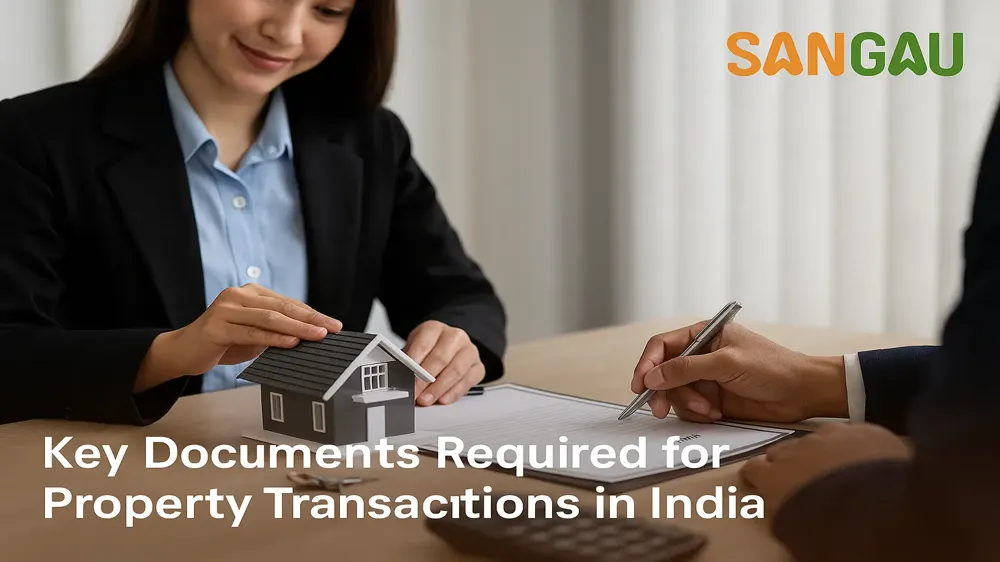Key Documents Required for Property Transactions in India
Published : 21 Jun 2025

Key Documents Required for Property Transactions in India
Buying or selling a property in India is a legal process that involves several essential documents to validate ownership, prevent disputes, and comply with real estate laws. Whether you are a first-time buyer or an experienced investor, understanding these key documents is crucial for a smooth and legally secure transaction. Proper documentation ensures transparency and protects both the buyer and seller from potential legal complications. This guide provides a detailed overview of the necessary documents required for property transactions in India.
1. Sale Deed: The Final Ownership Document
The Sale Deed is the most critical document in any property transaction, legally transferring ownership from the seller to the buyer. This legally binding document outlines key details such as the sale price, parties involved, and date of transfer. It must be executed on non-judicial stamp paper and signed by both parties in the presence of two witnesses. Registration at the local sub-registrar’s office is mandatory to establish legal validity.
2. Title Deed: Proof of Property Ownership
The Title Deed verifies the ownership of the property and ensures that the seller has the legal right to sell. It is essential for buyers to scrutinise the Title Deed to confirm that the property is free from disputes, mortgages, or encumbrances. This document protects buyers from acquiring a property with unresolved legal claims and should be thoroughly verified before proceeding with a transaction.
3. Khata Certificate and Khata Extract: Municipal Registration Records
In Bangalore and other Indian cities, the Khata Certificate and Khata Extract are crucial property records maintained by the local municipal corporation. The Khata Certificate certifies that the property is officially registered and assessed for municipal taxes. The Khata Extract provides specific details about the property, including the owner’s name, property tax details, and land usage. These documents are required for property registration, obtaining loans, and tax assessments.
4. Property Tax Receipts: Proof of Tax Compliance
Property tax receipts confirm that the seller has paid all municipal property taxes. Buyers should verify these receipts to ensure there are no outstanding dues that could lead to legal issues post-purchase. A property with unpaid taxes can cause legal disputes, so verifying this document is crucial for a hassle-free transfer of ownership.
5. Encumbrance Certificate (EC): Verification of Legal Liabilities
The Encumbrance Certificate (EC) serves as proof that the property is free from legal or financial liabilities. This document records all transactions related to the property, including mortgages, liens, or legal claims. Buyers should obtain an EC from the sub-registrar’s office to ensure that the property has a clean legal history, making it a critical document for securing home loans and property registration.
6. No Objection Certificate (NOC) from the Society or Builder
For properties in gated communities, apartments, or housing societies, an NOC from the builder or society is often required. This certificate confirms that there are no pending dues or disputes with the property. It ensures a smooth transition of ownership and protects the buyer from any unforeseen liabilities associated with maintenance or utility payments.
7. Identity and Address Proof: Verification of Buyer and Seller
Both the buyer and seller must provide identity and address proof to authenticate the transaction. Acceptable documents include Aadhaar cards, PAN cards, passports, and voter IDs for identity verification. For address proof, documents such as utility bills, rental agreements, or bank statements can be submitted. These documents are essential for property registration and compliance with government regulations.
8. No Objection Certificate (NOC) from the Bank (if applicable)
If the property is under a mortgage, the seller must obtain an NOC from the bank or financial institution. This document confirms that the seller has repaid the loan or is in the process of clearing any outstanding dues. The bank must also provide a closure statement confirming no further claims against the property. This ensures that the buyer does not inherit any financial liabilities post-purchase.
9. Power of Attorney (POA): Authority to Act on Behalf
In cases where the buyer or seller cannot be physically present for the transaction, a Power of Attorney (POA) may be required. This legal document authorises a representative to sign the Sale Deed, complete registration, and handle formalities on behalf of the principal party. A POA is especially useful for NRI property transactions and when dealing with legal heirs.
10. Agreement to Sell: The Pre-Sale Contract
An Agreement to Sell is a preliminary document outlining the terms and conditions of the property transaction. Unlike the Sale Deed, which is executed after payment, the Agreement to Sell is signed once both parties agree on the transaction details. This document includes the agreed sale price, payment terms, and conditions to ensure a legally binding commitment before finalising the deal.
How SANGAU Simplifies Your Property Transactions
Navigating property transactions can be overwhelming, especially with the extensive documentation involved. SANGAU offers expert assistance in verifying and preparing essential property documents, ensuring a smooth and legally sound process. From Sale Deed preparation to Encumbrance Certificate verification, our team provides end-to-end support to help you complete your transaction with confidence. Whether you are buying, selling, or managing a rental property, SANGAU’s trusted services help you handle legal requirements efficiently and hassle-free.
In Conclusion
We hope this guide has provided you with valuable insights into the key documents required for property transactions in India. Understanding and verifying these documents is essential to avoid legal complications.
Hashtags:
#PropertyTransactions #RealEstateIndia #LegalDocuments #PropertyLaws #SANGAU


